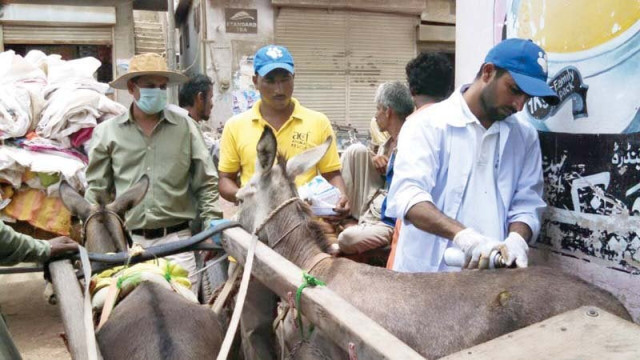On a mission: Someone to care for the beasts of burden
Every fortnight, ACF sends people, including a vet, to areas where donkeys have a high population

According to the founder, the fact that someone in the city cares for these hardworking animals and makes an effort to visit and tend to their needs is a form of encouragement for the owners. PHOTO: COURTESY ACF FACEBOOK PAGE
Perturbed by the treatment meted out to these hardworking creatures, Ayesha Chundrigar Foundation (ACF) began a drive to take care of the animals that go about sharing the city’s burden. Every two weeks, the organisation sends a group of five to six people, including a vet, volunteers and supervisors, with medical and food supplies. “We send our medical and food supplies to those areas of the city where the donkeys’ population is high,” shared the founder of the organisation, Chundrigar.
Apart from tending to animals’ needs, the team also educates the owners of the animal about treating them nicely. “Yes, it’s mostly the owners who mistreat their own animals,” said Chundrigar. “We try to teach them through actions.”
According to the founder, the fact that someone in the city cares for these hardworking animals and makes an effort to visit and tend to their needs is a form of encouragement for the owners. “It makes them [more] empathetic,” she said, implying that caring for their animals evokes empathy in the owners and encourages them to treat the animals well.
How badly are donkeys treated
The owners are mostly daily wage earners, whose incomes heavily depend on donkeys as the animals are their only source of transport, said Chundrigar. Due to bruises, cuts, blisters and regular beatings, the animals found by the team are in bad shape. According to her, some of them are also found to be suffering from severe medical conditions such as broken and disjointed legs and eye infections while others are also running a fever. “The amounts of weight placed on them is too much to carry,” said Chundrigar. “Plus, it’s uneven as it’s not placed in a balanced [manner], affecting their legs severely.”
Modus operandi
For the donkeys’ food, the medical team brings grass, apples and carrots along with fresh water to drink.
The teams of caretakers at ACF have so far visited Memon Goth, Saddar, North Karachi, Safoora Goth, Korangi and Sohrab Goth. Fifty or more donkeys are treated every time the team visits different areas in the city. “No, we don’t have permanent camps anywhere in the city,” said Chundrigar. “We find taking our drive from places to places more feasible.”
Published in The Express Tribune, June 22nd, 2016.



















COMMENTS
Comments are moderated and generally will be posted if they are on-topic and not abusive.
For more information, please see our Comments FAQ